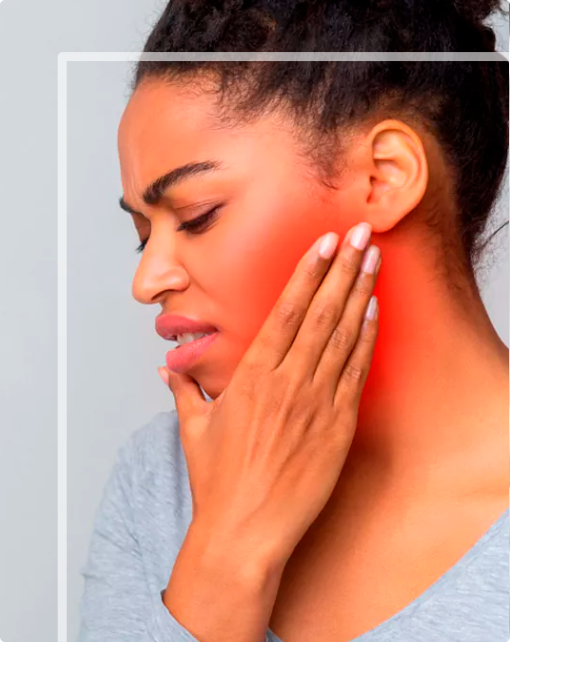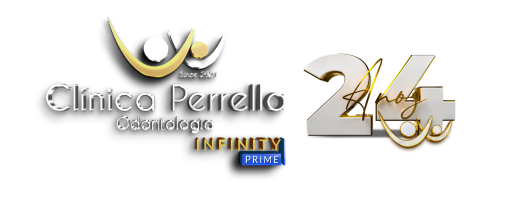Discover new reasons to smile!
TMJ Treatment

Book an Appointment

Temporomandibular Dysfunction
Dr. Bruna Luiza Silva
Every year, this dysfunction affects more than two million Brazilians, according to a survey by the Hospital Israelita Albert Einstein. It can impact individuals of any age, both men and women, although its incidence is higher among women.
What characterizes Temporomandibular Dysfunction (TMD)?
TMDs can be classified into three main subgroups:
• Articular: these are conditions where the signs and symptoms are related to the TMJ due to overload, trauma, and/or degenerative diseases (OA and RA);
• Muscular: where signs and symptoms are associated with the stomatognathic musculature, including tension and excessive chewing.
• Mixed: which combines both of the above disorders
TMJ (Temporomandibular Joint Dysfunction)
Symptoms such as localized pain, headaches, clicking when opening the mouth, and facial swelling can be indicative of TMJ. This swelling may even affect nerve endings, leading to altered sensitivity. Other issues may manifest, such as ringing in the ears and earaches, warranting evaluation by an otolaryngologist or neurologist.
TMJ can significantly impact a person’s quality of life, especially those who rely on clear speech, such as teachers and singers, as discomfort intensifies upon opening the mouth.
Causes of TMJ:
The factors contributing to Temporomandibular Dysfunction can be grouped into several categories:
• Parafunctional habits – Chewing gum, biting pen caps, nail-biting, etc. These habits, often linked to anxiety, can adversely affect oral health by positioning the mouth and facial bones abnormally, overloading the region.
• Emotional stress – Fluctuations in mood, particularly stress, often result in the individual maintaining facial muscle tension, affecting the TMJ.
• Hormonal changes – Conditions like Polycystic Ovary Syndrome (PCOS) can cause hormonal fluctuations, specifically alterations in estrogen levels. This imbalance triggers an inflammatory response in bones and cartilage, leading to TMJ.
• Systemic changes – Rheumatoid arthritis and fibromyalgia are chronic conditions that also induce inflammation, predisposing the joints to increased wear. Additionally, multifactorial etiology affecting 2.5-10 individuals can be related to structural, neuromuscular, occlusal factors:
Missing teeth and/or dental wear, ill-fitting prosthetics.
Cavities and inadequate restorations.
Traumas (violence, yawning, bruxism, sports, chewing).
Overjet > 6mm.
Anterior open bite, crossbite.
Treating TMJ:
Fortunately, office-based treatments resolve 95% of cases, with only a minority requiring surgery. The dentist will provide guidance on self-care, habit changes, and medication as needed, often prescribing muscle relaxants.
When parafunctional habits are so severe that they cause tooth wear, the professional may recommend using a myorelaxant splint to be worn between the teeth at night.
Orthodontic appliances can also help if a dental misalignment is contributing to TMJ. Physiotherapists can also contribute to treatment by making joint adjustments, providing pain relief, and relaxing facial muscles, as well as restoring lost functions and preventing relapses, promoting behavior change, thereby improving quality of life.
They use combined techniques such as: RPG, joint mobilizations, manual therapy, global TMJ release, relaxation, oral techniques, functional taping, electrotherapy, kinesiotherapy, acupuncture, etc. When surgery becomes necessary, it can be minimally invasive, resulting in few adverse effects and quickly returning the patient to normal activities.
In severe cases, surgical intervention is indeed necessary because, if left untreated, TMJ can worsen, posing a risk of structural rupture and other irreversible damage.
Want to learn more about TMJ? Click HERE to speak with our specialists.
SEE MORE TREATMENTS BY CLICKING HERE.
FOLLOW OUR SOCIAL MEDIA:
Dental Implant Specialist
Experienced Implantologists, highly trained staff, and state-of-the-art technology. All designed with your safety in mind.
Facilities
We have five treatment rooms, one specifically for post-surgical care to ensure the patient's complete recovery.
Human-Centered Treatment
Our entire team is dedicated to restoring happiness, self-esteem, chewing strength, and quality of life for you!
Wheelchair Accessibility
Accessibility for wheelchair patients: elevator access, level flooring, and restrooms equipped for your comfort and safety.
On-Site Parking
For the enhanced comfort and convenience of our patients, we offer on-site parking.
Testimonials
Genuine testimonials from patients who found their best smile with Perrella Dental Clinic!
Trustindex verifica se a fonte original da avaliação é Google. Fiquei maravilhada com todo atendimento da clínica Perrela e estrutura de primeiro mundo,desde o início do atendimento com a Cris, estacionamento com atendimento ímpar e todo aconchego que vcs nos recebeu. Todo carinho e atenção da Dra Helen , atendimento da Cecília / Katia em fazer o melhor e o Dr Renato que iniciou o canal um fofo, Dr Gabriel mãos de fada nem senti rsrs, as meninas da recepção muito atenciosas e ao Dr Murilo e a Dra Débora meus parabéns, por essa equipe maravilhosa . Sentindo se cuidada.Trustindex verifica se a fonte original da avaliação é Google. Ótimo atendimento.Trustindex verifica se a fonte original da avaliação é Google. Tudo de mais moderno no tratamento odontológico. Atendimento perfeito com muita simpatia.Trustindex verifica se a fonte original da avaliação é Google. Excelente local. Você é tratado com todo respeito,e atenção que merece. Profissionais mais que capacitados,para atender da melhor maneira possívelTrustindex verifica se a fonte original da avaliação é Google. Ótimo atendimento. Ótimos profissionais!!Trustindex verifica se a fonte original da avaliação é Google. Sou paciente da Clínica Odontológica Perrella e sempre fui muito bem atendida. A equipe é muito profissional e atenciosa, e os procedimentos são sempre realizados com muito cuidado e atenção. Estou satisfeita com os resultados e recomendo a clínica para todos que buscam um atendimento de qualidade, zelo, cuidado para um sorriso melhor. Parabéns para toda a equipe.





